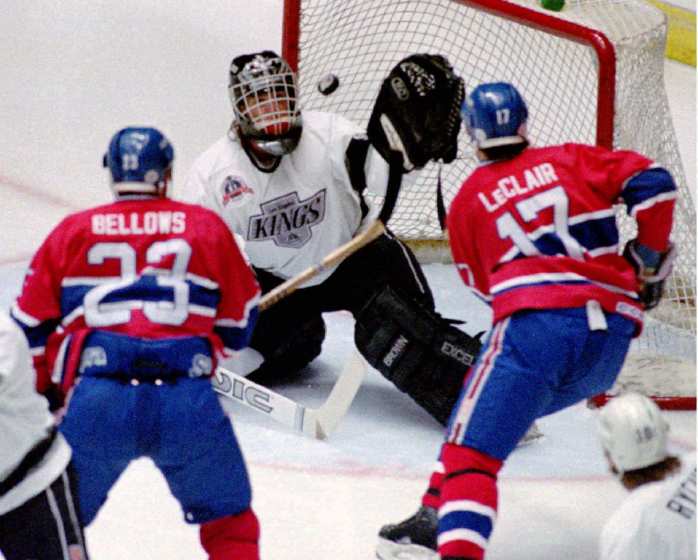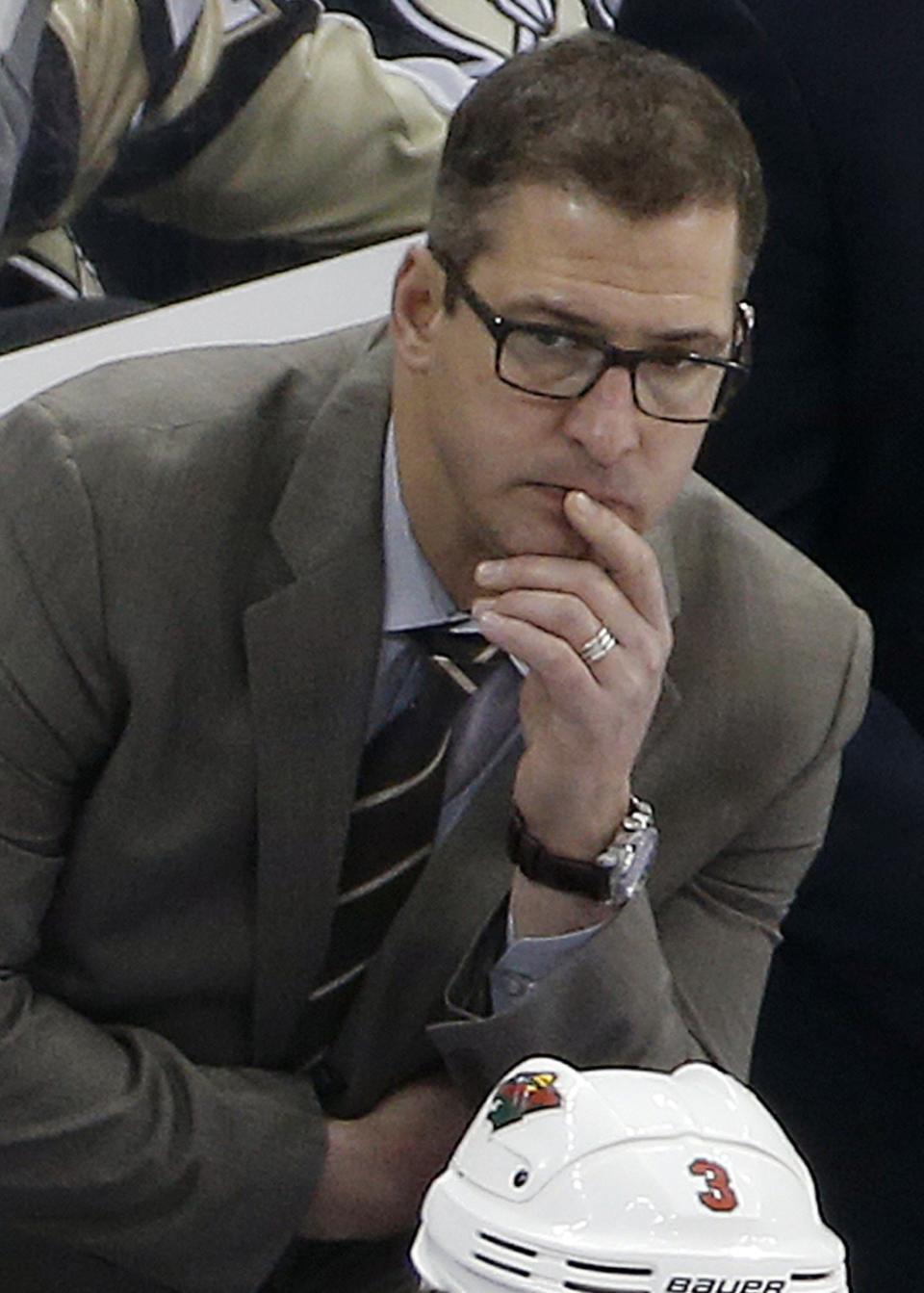Elliott: Mental health no longer dirty words in macho world of NHL

Hockey players are celebrated for their toughness. It’s common for a player to absorb a booming hit without flinching, or to lose a row of teeth to an errant puck and say he’s sorry he had to miss a shift to get sewn up. Tape an aspirin to it and get back out there was the game’s unofficial slogan.
The idea of suffering in silence also applied to mental health issues. No one spoke publicly about depression or anxiety. You toughed it out. That’s how it always had been done.
That archaic code is fading, its departure hastened by former NHL goaltenders Kelly Hrudey and Corey Hirsch. In talking about their struggles and advocating for mental health awareness and treatment they’ve elevated a discussion that became especially relevant when the COVID-19 pandemic isolated people and clouded the future.
Hrudey, a former King, and Hirsch are emphasizing that it's a sign of strength to seek help, not weakness, as they tell their stories and strip away the stigma that lingers around mental health issues.
May was designated Mental Health Awareness month before hockey was shut down, but the pause in the schedule allowed both men to continue raising their voices. Hrudey, who wrote a book about his youngest daughter’s battles with anxiety and obsessive-compulsive disorder and his own anxiety, is effectively using social media to advocate for the availability of mental health resources.
Hirsch, who has spoken to kids and adults about recognizing and treating mental health issues, started a Facebook broadcast he calls “The Mind Game,” which features former athletes. His recent conversation with former King Darryl Sydor, who has undergone treatment for alcoholism several times, was striking and blunt.
“I’m so proud to talk about this,” Hrudey, a member of the Kings’ 1993 Stanley Cup Final team, said from his home in Calgary, Canada. “I’m proud of my playing career, I’m proud of my broadcasting career but most proud of the work I’ve done in the field of mental health.”
Hrudey was an established NHL goalie when the Kings acquired him from the New York Islanders in February 1989. Yet, he was overcome by fear before the 1992-93 season.
“I was going through these things where my brain was telling me, 'I don’t know if you can do this any longer. I don’t know if you can stay at this level.' It was just putting all this doubt in my head,” he said. “I was to learn later from our daughter Kaitlin about the loop in a person’s brain and I didn’t have the skills at that point to break the loop. I had no tools to do it, so that loop kept getting louder and louder.”
The noise crested before a neutral-site game that season in Milwaukee, when he took refuge in a bathtub.
“I became unglued,” he said. “I somehow was able to play really well in the next game and for a couple games after that but then it all came crashing down and I was lost.”
He credits then-coach Barry Melrose for referring him to Tony Robbins, author and self-help motivational speaker.
“They were able to get me out of that situation,” Hrudey said.
He still has occasional anxiety but it hasn’t stopped him from offering calm and keen insight as a TV analyst. He blames himself for not realizing something was amiss with his daughter when she was 11 and refused to go to school or dance class.
“I looked at everything she was going through as a quirky little habit. Had I put it all together I think I would have been able to come to the conclusion earlier that no, these aren’t quirky little habits. She’s having some real issues,” he said. “When we realized it, because her life became completely debilitating, then we needed to get her help.
“Still to this day, she has issues about dying and diseases, and so through this pandemic she’s been super-worried. Is this going to trigger something new again? Luckily for us she’s been OK. She’s been able to handle it. But in this time it’s been incredible to see what’s going on with people.”
“That was just not the way I was brought up, to ask for help. ... Suck it up and don’t talk about it."
Darryl Sydor

Hrudey, whose daughter now is 27, urged those who need support now to search online or have someone assist them.
“I’m not trying to pressure somebody that isn’t comfortable in sharing their story because it’s personal, and maybe sharing is not for you,” he said. “That’s fine, as long as you’re trying to get the help that you need. Because there’s no reason to suffer in silence.”
Hirsch, a commentator on Vancouver Canucks’ radio broadcasts, believes the pandemic has chipped away at that repressive silence.
“I’m hoping that, and I wish it didn’t happen this way, that we come to realize after this is over how important mental health is. How real it is and how much bigger it is than we’ve treated it in the past, geopolitically and socially,” he said. “I’m hoping that it really expands our vision, because everybody’s feeling anxiety right now. Everybody’s feeling the pinch. I’m seeing there’s a lot of people out there that are struggling with this.
“There’s still masculinity, ego and pride in the reasons why people won’t reach out but we’re all struggling a little bit here, so you can set your pride aside and your ego and get help.”
His Facebook conversation with Sydor couldn’t have happened even as recently as 10 years ago, so strong was players’ reluctance to speak up.
“That’s why someone like myself even went into hiding,” said Hirsch, who wrote a story in the Players’ Tribune in 2017 detailing his suicidal thoughts and how he’d barely stopped himself from driving his car off a cliff in 1994. That incident occurred only months after he won an Olympic silver medal with Canada and was the third goalie on the New York Rangers’ Cup-winning team.
Sydor said he didn’t get treated for addiction or compulsive behavior for years because, “That was just not the way I was brought up, to ask for help. ... Suck it up and don’t talk about it.”
That mind-set is changing in hockey, as Hrudey, Hirsch, former NHL goalie Clint Malarchuk and Canadian TV sportscaster Michael Landsberg lead the way in showing it’s OK to discuss being vulnerable to mental health struggles.
“I’m just so excited about what it might look like in 10 years, 15 years,” Hrudey said. “Maybe it’s not as quick as I’d like it to be but I’ve seen the change in the attitude amongst people sharing their stories and listening in the last bunch of years. I’m so hopeful that in 10 years it’s going to be such a normal conversation.”

